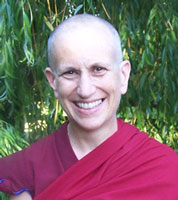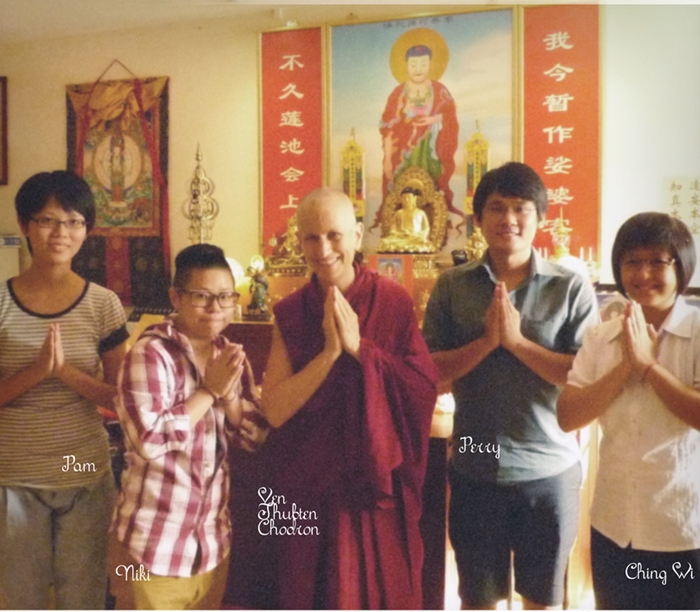By Poh Yong Hui, first published 16 Nov 2011
Yesterday, I had the immense good karma to chat with Venerable Thubten Chodron and my fellow Dharma friends, Perry, Ching Wi, and Niki about our practice and innermost thoughts toward Dharma work. I went without any expectations; and I didn’t have a single question in my head for the Venerable.
Perry started by sharing a framework for Dharma education, that he and Wen Jie, another Buddhist youth leader, came up with. In just a few words, Ven. Chodron summed up the key characteristics that such a framework should have:
- People like to know there’s a structure to the path, so it’s good to provide this for them.
- How the discussions happen is key. The session has to draw people out so they can share about what’s going on in their lives. (And isn’t this what the Dharma is all about?) When people come to Buddhist centres, they’re not just seeking information. They’re seeking virtuous friends and internal transformation. So we need to create an environment conducive for this type of sharing.
Perry mentioned the word “frustrated” quite a few times. Having been (actively and not-so-actively) involved in Dharma propagation since 2007, I, too, have been through periods of intense frustration and disappointment with the conditions and people that I had to work with. So I could understand Perry when he told us how frustrated he was, with the Dharma being so perfect, and yet he still hears people telling him they “are lost even after five years of being in a Buddhist group”.
I have come to realize that for me the best way to propagate the Dharma is to embody it. However, I do not practice very hard. The only sutra that I can memorise is the “Heart Sutra,” as my mother taught me to chant it when I was young. I attend meditation retreats, but I often doze off. I am seldom able to solve kong-ans (Zen riddles). I often have thoughts of aversion towards people I dislike. But I tell myself that it’s okay, as I am trying. Like all my spiritual friends, who are trying so hard to make time for self-cultivation and helping others at the same time, I do what I am able to do. This thought alone comforts and moves me deeply. I do not feel guilty, and I know I do not need to.
In my hiatus of sorts, I came to realize that being kind to myself is the only way I can be kind to others. I have to make time for my own practice. I am not there yet, but I am trying. Ven Chodron told me before I left that this was a good attitude to have.
Ven Chodron pointed out that people often do not see their own good qualities and that part of our Dharma practice is to point out people’s good qualities to them. We do this not to flatter them, but with a sincere mind that admires others’ virtues and good qualities. Hearing that others see goodness in them, people are encouraged to practice. I am fortunate enough to have friends and family who are extremely affirming of my talents and abilities, while wisely guiding me along the way. Perhaps we should go about surrounding ourselves with such friends.
Ven Chodron also reminded us that right motivation is the most important thing. Sometimes we can be so goal-oriented (having grown up in Singapore), that we forget about the process. But the Dharma is all about the process, she said. “All this doubt and frustration is part of the process. It is what you have to work with, to transform into the path. What you’re doing and the difficulties you experience are not wasted energy. Learning how to work constructively with these circumstances is the bodhisattva path.”
Thank you, Venerable, for this teaching. It was so gratifying to hear this, as I still feel helpless from time to time, wondering why things are this way and that, why I just cannot work with some people. “There are so many conditions that must come together, and everyone has different karma. You cannot control others’ present actions or the karma they bring with them from the past. All you can “control” is your own mind, your own motivation. In addition, when you work on a project that can benefit many people, its success depends not on your actions alone, but on the karma of all the people who have the potential to benefit from this project.”
With practice, I think I can learn to accept this fact of life, and my “trying” can be done with so much more joy. Ven. Chodron also advised that as Dharma workers, we have to ask ourselves, “What is it that moves me, and what do I aspire for?” When we know this clearly, we’ll be much more patient with ourselves.
Measuring the “success” of our Dharma propagation work could be an issue in results-oriented Singapore. Ven. Chodron shared that the way she measures success is not by numbers—the number of people attending an event or the amount of money raised for a beneficial project. Rather, success is when the friends and family of the people she works with say, “You’re a lot nicer person now. You don’t get as angry as you used to; you’re kinder and more peaceful now”. Isn’t this the Dharma’s function, and isn’t this what the work we’ve been doing is all about?
That day, I went home remembering all the affirmation, unconditional help, and scathingly honest advice that I have received from likeminded spiritual friends and teachers all these years, and I felt deeply grateful that our paths have crossed. That was the first time I could fully identify with what the Buddha said about spiritual friends, “Spiritual friendship is the whole of the holy life”; and my wish to practice hard so I can benefit myself and others, became stronger than before.
The writer is a volunteer with Dharma In Action, a gathering of Buddhists from all walks of life collaborating on innovative and pertinent initiatives that foster stronger fellowship within the Buddhist community in Singapore. They see themselves as a dynamic platform where engaged Buddhists can share resources and work together open-mindedly, for the betterment of the Buddhist community, and ultimately, the society. Hence, they always welcome collaborations with fellow Buddhists and organizations.


Leave a Reply